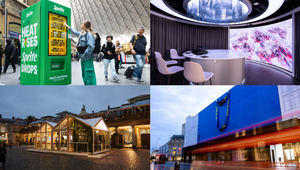
Play: The Fundamental Human Need That Will Reshape Marketing

As an industry, we know that people's attention is a finite (and vastly over-subscribed) resource. One tactic to capture it is, of course, to invest time and resources into creating 'compelling content' - usually delivered through technology. But our ambitions for what technology should deliver - more specifically, about the kind of interaction it is - need to be challenged. The very qualities that we value in making our lives run more smoothly - 'slick', 'seamless', 'frictionless' – can have the opposite effect when it comes to creating memorable content. We present our work to consumers on screens and to clients on 'slides', but how much of it really sticks? What if our work had seams, shape and substance - a form and texture that people could literally 'grasp'.
Even more baffling, this non-contact nature extends to physical experiences. I suspect galleries have something to answer for here. I went to an exhibition about Japanese housing at the Barbican over the Easter weekend, and one room in particular struck me: a celebration of the creativity of modern architects, where examples - including a colourful array of building blocks - are placed on spot-lit plinths. The implicit message was clear: look but don't touch. Admire, but don't join in.
Like many children, I loved playing with building blocks when I was younger. And Sticklebricks, Lego, Meccano and K'Nex (ah, the nostalgia!). But at some point in our education, by invisible consensus, we leave learning through play behind. We stop understanding the world and its complex interrelationships through the immediate, tactile, bright interactions we experience as children and instead move further away, to a distant whiteboard, practice questions, a teacher's voice - usually at the exact point where information becomes more abstract and difficult to comprehend.
This makes absolutely no sense. And society and the world at large, is slowly realising this. And it presents an opportunity within marketing - play, in all its various forms, should be the defining mechanic for how brands communicate with people in the 21st century.
Play, imaginatively applied, can reimagine the relationships between brands (or institutions) and people. For example, the Cleveland Museum of Art revitalised the way guests interact with art through a myriad of playful experiences. Visitors were invited to pull a face and strike a pose, or draw a line of any shape and see it matched to a piece from the museum’s digitised archive. Or to choose their favourite works from a vast digitised wall and then pick up a tablet that defined a path through the museum connecting every single one of their chosen works. In this way the museum created a playful and user-centric, rather than museum-led, way of interacting and engaging with content.
A report in Psychology Today on the neuroscience of joyful education provides further insight into learning through play by outlining the ingredients needed to create an optimally engaging classroom. The key, it says, is to combine challenge with novelty in a non-stressful environment. This is when information flows freely and students achieve higher levels of cognition, make connections, and experience ‘aha’ moments. This kind of learning "doesn’t come from quiet classrooms and directed lectures, but from classrooms with an atmosphere of exuberant discovery."
Play is, of course, fun. And when we take pleasure in something, the brain releases dopamine - a neurotransmitter that stimulates the memory centres and promotes the release of acetylcholine, which in turn boosts focused attention. It's this reaction, stimulated by novelty and challenge, that creates that 'atmosphere of exuberant discovery'.
This is the atmosphere our team at Jack Morton wanted to evoke when working with Honda to create the brand’s experience at the Goodwood Festival of Speed in 2016. The concept was inspired by how we, as children, express our love and passion for cars: through play. And so, in an environment of more traditional exhibition stands, we created an instantly relatable toy garage - brightly coloured and covered in 'stickers', where every Honda product was brought to life for the public through interactive childhood games.
Used correctly technology can, of course, be a great enabler of play. Computer games and emerging technologies - like VR and augmented reality - are pioneering new levels of interactivity for consumers. The immensely popular Minecraft offers an open-ended, discovery-led experience - reshaping what an interactive medium means for a new generation of consumers. These values and expectations are also seeping into the ‘real’ world, as retail 'exploratoriums' (such as Sonos' flagship NYC store) create environments that encourage exploration and immersion. As 'blended reality' evolves, the disciplines of computer game design and creative marketing will continue to blur, reshaping how we interact with brands in the physical world.
When American writer and critic Samuel Delany talked about the difference between good writing and talented writing, he wrote: “Good writing is clear. Talented writing is energetic. Good writing avoids errors. Talented writing makes things happen in the reader’s mind — vividly, forcefully — that good writing, which stops with clarity and logic, doesn’t.”
This is what powerful communication – and play – achieves. It makes things happen in people's minds. It sparks neurons, evokes emotions, acts as a bridge that translates abstract information into a tangible, memorable experience. It will reshape our relationships with brands across every touchpoint. And - it's fun. So let's create experiences that give people the same joy they first experienced when building castles out of Lego all those years ago - it's the most natural thing in the world.
Lewis Robbins is Senior Creative Associate at Jack Morton Worldwide













